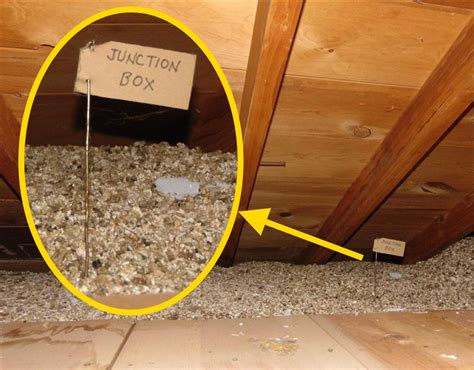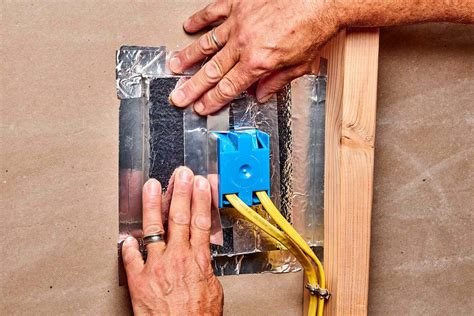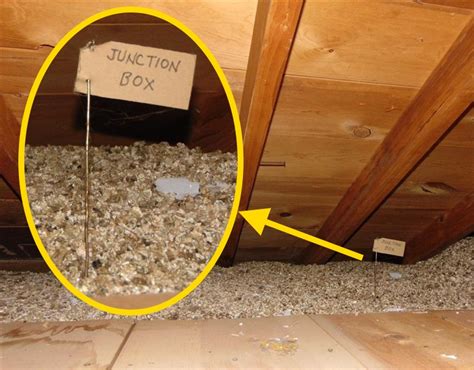how to install cellulose insulation around junction boxes Are there any restrictions on blowing cellulose insulation into an attic and burying the cable and junction boxes? What is a breaker box? A breaker box is a device used in homes and commercial buildings that houses the main electrical switch. It protects against electrical overloads, ensuring no circuit gets too much power and shuts off automatically if an overload occurs.
0 · insulation for junction boxes
1 · insulation for attic junction boxes
2 · electrical boxes in insulation
3 · covering attic junction boxes
4 · can you insulate junction boxes
5 · buried electrical boxes in insulation
6 · attic junction cover insulation
7 · attic junction box insulation requirements
Metal fabrication is a manufacturing process used to shape metal into parts or end products. It usually consist of three phases: 1) design, where shop drawings are created to the intended measurements; 2) fabrication, which involves .
Can you lay insulation over electrical wires in the attic? Yes, you absolutely can. You can lay insulation around the junction boxes as well. Making sure that the insulation is of a . Is it safe (up to code) to cover the junction boxes with more insulation or is this considered concealing them? Would I have to raise all of the junction boxes above the . We know that the covers for electrical boxes need to be accessible, but what if the box is located in an attic? Is it acceptable to bury the box in insulation? I said I’d research this info and get back to him, but I thought this . Are there any restrictions on blowing cellulose insulation into an attic and burying the cable and junction boxes?
The IRC and NEC don’t expressly prohibit covering a junction box with insulation. However, they require junction boxes to be readily accessible without removing a permanent finish. In some cases, insulation might classify .Electrical Junction Box in Attic: Things You Need To Know. Elevate attic safety with our guide on junction box in attic usage. Learn installation rules, NEMA categorizations, and crucial FAQs for a secure wiring setup. Get a Free Quote.
Thermal insulation must be installed a minimum distance of 3 inches from any recessed lighting fixture, wiring compartment or ballast. Additionally, the insulation cannot be .It is also believed that you cannot install insulation around junction boxes by most people. In contrast, fiberglass insulation can be laid around junction boxes without problems. . Currently, cellulose fiber insulation is the most popular insulation . Finally, ensure you have gloves, goggles, and a mask for your protection. When all materials are gathered, you can then begin the insulation process around your electrical boxes with ease. Preparing For Insulation. .I wanted to insulate my attic with cellulose. I noticed that I have electrical wires running in the attic as picture below. . You also don’t want any exposed splices buried in the insulation. Junction boxes are a bit of a gray area, my preference .
Adding insulation around light fixture boxes and junction boxes? . With junction boxes, you can lay the insulation right over the boxes. No harm in that at all. One tip: caulk around the box where it meets the drywall and seal any holes in the junction boxes first. It will reduce air flow from the living area into the attic and reduce drafts. The NEC has specific rules regarding clearance around recessed lighting fixtures. Thermal insulation must be installed a minimum distance of 3 inches from any recessed lighting fixture, wiring compartment or ballast. Additionally, the insulation cannot be installed above the fixture in a way that would trap heat and prevent air circulation. Like fiberglass insulation, homeowners should begin checking cellulose insulation in the attic for noticeable degradation around 15 years after having it installed. 7.Just use the right ROMEX adapter in the box when running the wire in it. Dont just punch a hole out and stick ROMEX in it and wire up. Secure the wire so it doesnt rub through.
When installing junction boxes, avoid placing a metallic box in a nonmetallic raceway (enclosed tube for wire protection) unless you ground the box with a wire. . including cellulose attic insulation, spray foam, roofing and more. Founded in 2009, this year we are proudly celebrating our 15th anniversary! Navigation. Home. Service Areas.
insulation for junction boxes

insulation for attic junction boxes
junction box itself is no issue. Covering it up is pushing it a bit. You would be removing part of the finish (insulation) to get to it. I think his main concern is not being able to locate it. Might ask him if he would go for 2x4 painted red sticking up saying junction box. Still, depending on the installation’s location (Arizona vs. Maine, for example), on whether or not the attic is vented or unvented, and on whether some of the junction boxes also contain light fixtures (which generate heat), installing insulation around existing wiring could violate one of these NEC performance standards.

Why Junction Box Must Be Accessible. If you are wondering why a junction box needs to be readily accessible, let’s look at one of the primary aims of the codes: keeping you safe. A junction box is used for housing the wiring of light fittings or ceiling fans (also called a ceiling fan box) or for containing any point where multiple wires are .
Hi everyone, thank you all for your valuable advice, during the past week, I've done the following: 1- I secured the remex cables coming through the light metal box by using Helux push-in connectors. 2- I fixed the metal boxes to the joists. 3- covered the light boxes with the proper recessed light covering and insulated them with foam.from which insulation is to be excluded, such as electri-cal boxes, should be masked. After application the insulation is made even with the stud faces by a "stud scrubber." The wall can be closed shortly after installation of the insulation, however va-por retardant material, such as some types of paint andWhen you’re installing or adding insulation in your ceiling, your floor, or around recessed lighting, it’s important that you don’t actually place insulation on the pipes, electrical wiring or junction box (unless it’s IC-rated, in which case it will be clearly labeled.)
It’s done by multiplying the R-value of the insulation by the depth of insulation you want. For example, if you’re using batt insulation with an R-value of 3 and want a total insulation R-value of 30, you need to install 10 inches of .Add insulation: Once you install and seal the covers, you can add insulation around and over the fixtures. Follow the manufacturer’s guidelines for the insulation material you choose. Additional Tips for Insulating Around . Begin by collecting old newspapers, cardboard boxes, and any other paper waste you’ve lying around. Make sure the paper is clean and free from any contaminants like ink or tape. . Installing cellulose insulation requires proper insulation techniques to maximize its benefits. Cellulose insulation is made from recycled paper and treated with .
Maybe it's a local code thing, but around here I've never seen the junction boxes in an attic mounted on the side(s) of a ceiling joist. The are always mounted on the top of the joist with the wiring run on the side, some type of securing device (usually a wire staple) securing the wires within twelve inches (12") of the box and per code here-a cover always on the box. The catch is that the insulation is blown cellulose and that I do not plan on installing the inceiling speakers right away, but would probably install them a year or two after moving in. . I spent all day up in my attic covering junction boxes and prepping to have green fiber cellulose blown in tomorrow. I cut 16" squares of R13 bats just . With blown in insulation, am I at risk of the cellulose clogging the ridge vent or blowing around? If there is an issue, is Tyvek an option to cover the top of the insulation to prevent it from moving? Or is the whole house fan a bad route to go as I’m opening a hole in the ceiling that will require an insulation box? Thanks, Josh
Your Queries:-how tohow to insulate around electrical boxes,electricalelectrical boxelectrical boxesair sealed electrical boxinsulating around electrical box. The installation of vapour barrier around electrical outlet boxes is not an electrical code requirement; it is a requirement of the Ontario Building Code that is enforced by your municipal building inspection department. An alternative to filling the junction box with fiberglass insulation is foam insulation around electrical junction boxes. That way, you can prevent energy loss and still use your outlet. First, use a screwdriver to remove the cover plate and then inspect the area to . I spoke to an electrician who said he could replace the knob & tube that is in the attic to Romex so that it would be safe to have cellulose insulation around it. His process would be to take the knob & tube that runs up and inside the walls and add a junction box, where he would then change out the existing wiring and add the Romex.
Determine the desired installed thickness of the insulation, and then measure and mark the rafters as a guideline to be used during application. Prepare a rigid barrier around the attic access hole to prevent insulation from falling out when you open the attic door. The barrier should be as tall as your installed insulation height.
I took a look at the insulation around the recessed light cans from the attic, and there is none. The cans have holes in them, so my precious warm air is leaking right out of these areas. . (Insulation Contact) direct install LED recess lighting, that you can use without the need for a recessed lighting can. . (there's a multi-position . Separate the circuit wires at the existing splice and loosen the cables as needed to make room for the new junction box. Anchor the box to the framing (or other support structure) with screws driven through the factory-made holes in the back or side of the box, as applicable. . Carefully fold the wires into the box. Install the box cover .

electrical boxes in insulation

316 stainless steel cabinet hardware
Yellow box junctions are indicated by criss-cross yellow lines painted on the road. They are usually found at the junction of two or more roads and occasionally at roundabouts or.
how to install cellulose insulation around junction boxes|attic junction cover insulation